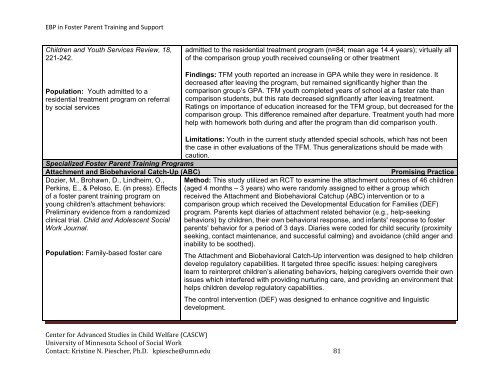Evidence-Based Practice in Foster Parent Training and Support ...
Evidence-Based Practice in Foster Parent Training and Support ...
Evidence-Based Practice in Foster Parent Training and Support ...
Create successful ePaper yourself
Turn your PDF publications into a flip-book with our unique Google optimized e-Paper software.
EBP <strong>in</strong> <strong>Foster</strong> <strong>Parent</strong> Tra<strong>in</strong><strong>in</strong>g <strong>and</strong> <strong>Support</strong>Children <strong>and</strong> Youth Services Review, 18,221-242.Population: Youth admitted to aresidential treatment program on referralby social servicesadmitted to the residential treatment program (n=84; mean age 14.4 years); virtually allof the comparison group youth received counsel<strong>in</strong>g or other treatmentF<strong>in</strong>d<strong>in</strong>gs: TFM youth reported an <strong>in</strong>crease <strong>in</strong> GPA while they were <strong>in</strong> residence. Itdecreased after leav<strong>in</strong>g the program, but rema<strong>in</strong>ed significantly higher than thecomparison group’s GPA. TFM youth completed years of school at a faster rate thancomparison students, but this rate decreased significantly after leav<strong>in</strong>g treatment.Rat<strong>in</strong>gs on importance of education <strong>in</strong>creased for the TFM group, but decreased for thecomparison group. This difference rema<strong>in</strong>ed after departure. Treatment youth had morehelp with homework both dur<strong>in</strong>g <strong>and</strong> after the program than did comparison youth.Limitations: Youth <strong>in</strong> the current study attended special schools, which has not beenthe case <strong>in</strong> other evaluations of the TFM. Thus generalizations should be made withcaution.Specialized <strong>Foster</strong> <strong>Parent</strong> Tra<strong>in</strong><strong>in</strong>g ProgramsAttachment <strong>and</strong> Biobehavioral Catch-Up (ABC) Promis<strong>in</strong>g <strong>Practice</strong>Dozier, M., Brohawn, D., L<strong>in</strong>dheim, O.,Perk<strong>in</strong>s, E., & Peloso, E. (<strong>in</strong> press). Effectsof a foster parent tra<strong>in</strong><strong>in</strong>g program onyoung children's attachment behaviors:Prelim<strong>in</strong>ary evidence from a r<strong>and</strong>omizedcl<strong>in</strong>ical trial. Child <strong>and</strong> Adolescent SocialWork Journal.Population: Family-based foster careMethod: This study utilized an RCT to exam<strong>in</strong>e the attachment outcomes of 46 children(aged 4 months – 3 years) who were r<strong>and</strong>omly assigned to either a group whichreceived the Attachment <strong>and</strong> Biobehavioral Catchup (ABC) <strong>in</strong>tervention or to acomparison group which received the Developmental Education for Families (DEF)program. <strong>Parent</strong>s kept diaries of attachment related behavior (e.g., help-seek<strong>in</strong>gbehaviors) by children, their own behavioral response, <strong>and</strong> <strong>in</strong>fants' response to fosterparents' behavior for a period of 3 days. Diaries were coded for child security (proximityseek<strong>in</strong>g, contact ma<strong>in</strong>tenance, <strong>and</strong> successful calm<strong>in</strong>g) <strong>and</strong> avoidance (child anger <strong>and</strong><strong>in</strong>ability to be soothed).The Attachment <strong>and</strong> Biobehavioral Catch-Up <strong>in</strong>tervention was designed to help childrendevelop regulatory capabilities. It targeted three specific issues: help<strong>in</strong>g caregiverslearn to re<strong>in</strong>terpret children’s alienat<strong>in</strong>g behaviors, help<strong>in</strong>g caregivers override their ownissues which <strong>in</strong>terfered with provid<strong>in</strong>g nurtur<strong>in</strong>g care, <strong>and</strong> provid<strong>in</strong>g an environment thathelps children develop regulatory capabilities.The control <strong>in</strong>tervention (DEF) was designed to enhance cognitive <strong>and</strong> l<strong>in</strong>guisticdevelopment.Center for Advanced Studies <strong>in</strong> Child Welfare (CASCW)University of M<strong>in</strong>nesota School of Social WorkContact: Krist<strong>in</strong>e N. Piescher, Ph.D. kpiesche@umn.edu 81
















